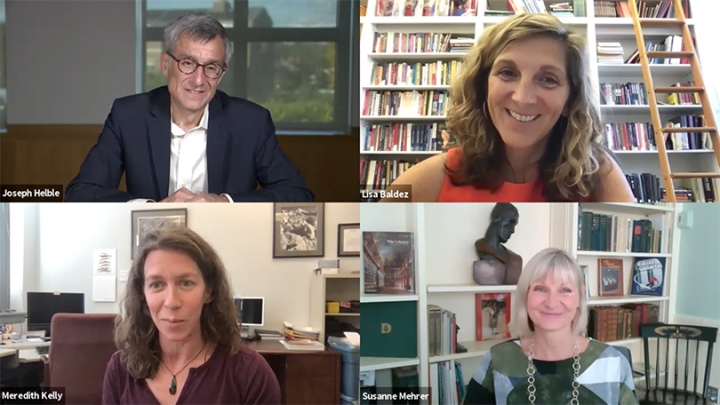“In some ways I’ve been almost enchanted by the things that we can do online that I’m not sure how we would replicate in the classroom,” Lisa Baldez, professor of government and Latin American, Latino, and Caribbean studies, said during this week’s Community Conversations webcast.
Baldez, a former director of the Dartmouth Center for the Advancement of Learning (DCAL), was speaking with Provost Joseph Helble about her experience teaching an online version of “Introduction to Latin America” this fall. Helble is the host of the online webcast, which aims to help Dartmouth community members learn from campus leaders about the institution’s priorities, decisions, and operations during the pandemic.
In addition to Baldez, Helble was joined by Meredith Kelly, an associate professor of earth sciences; and Sue Mehrer, the dean of libraries, for a discussion of how teaching and learning have been going since fall term classes began. Helble and his guests took questions from viewers in a conversation moderated by Justin Anderson, vice president for communications.
“Nothing can replace what it feels like to have an in-person classroom,” Baldez said—but she’s noticed that online, “students feel really comfortable asking questions. It feels more casual. People speak more freely. There are all kinds of dynamics in a classroom that are invisible but very felt—and those things are gone. So there’s a very a different dynamic.”
About half of Dartmouth’s undergraduates are taking classes remotely while on campus for fall term, the other half is learning remotely at home or at other off-campus locations. Helble gave an update on Dartmouth’s COVID-19 testing, which has transitioned to a weekly testing regimen administered to all students at Leverone Field House. (Dartmouth’s COVID-19 Dashboard and up-to-date information on current pandemic-related policies are available on the Dartmouth Together website.)
Though the numbers on campus and in the surrounding state and local communities are reason for encouragement, Helble stressed that national trends show that “we are not close to being out of the woods” with the global pandemic. “There is great danger in becoming overconfident.”
To that end, Helble emphasized that conservative travel restrictions remain in place for the Dartmouth community. “I cannot say this clearly enough: No one—employees included—may ‘test out’ of the quarantine requirement after traveling outside of the designated area,” he said. “We all recognize that this is restrictive, but we are asking everyone to sacrifice some individual freedom in support of the greater community good.”
In response to a question about the policy on wearing masks, Helble said, “When in doubt, wear it”—including in any space, indoors or out, where you might encounter another person.
“Part of it is to build a habit. Part of it is to build reassurance in the community that we’re all taking this seriously. Wear it whenever you’re in a public place,” he said.
Mehrer described how Dartmouth Libraries continued to work for students and faculty through the spring and summer, even while the library’s doors were closed.
“Our subject-specialist librarians worked very closely with faculty and students to identify resources suitable for online learning and teaching, or find alternatives to resources that were temporarily unavailable—scanning and digitalizing materials from our own collections and making sure that resources were still available in that online environment,” she said.
Students on campus now have limited access to study in the library, and can access collections—including in Rauner Special Collections Library, by appointment.
“In addition to that, the Rauner Library staff has devised a system for streaming materials from their classroom, so students, wherever they are, can interact with special collections and their materials,” Mehrer said. “We’re trying to remove as many barriers as we can to make access possible for students.”
Kelly spoke about co-teaching “Earth Sciences 1” as a so-called “flipped class” in which students view prerecorded lectures before class and use Zoom discussions for problem-solving.
“I was really worried that students wouldn’t ask questions in a Zoom environment with 60 people, and they do.” Kelly said. “I want to give a shoutout to all my ”EARS 1“ students. People are unmuting themselves and asking questions. We’ve been having a great discussion. It’s been super fun.”
She and her colleagues received a grant from DCAL to send students lab kits of the rocks and minerals they are learning to identify, and the team has developed a series of 3-D virtual field trips to introduce students to geological formations.
Kelly and Baldez expressed gratitude to staff—from learning designers to librarians to curators at the Hood Museum of Art—who have been supporting their transition to remote teaching. And both said they miss being in the classroom.
Helble says that while there are challenges ahead, he is encouraged by how well the fall term is going.
“I could not be prouder of the way everyone—students, staff, faculty, and the local community, everyone—have come together to make this work,” he said. “So to everyone in the Dartmouth and in the local community, let me simply say, sincerely: thank you.”
Community Conversations is a live production of Dartmouth’s Media Production Group and the Office of Communications that airs on selected Wednesdays at 3:30 p.m. The next webcast is scheduled for Oct. 14.
Past episodes are available on the Community Conversations site, which includes call-in numbers for those who want to listen to the show without video. Find out how to watch or listen to the live webcast.

